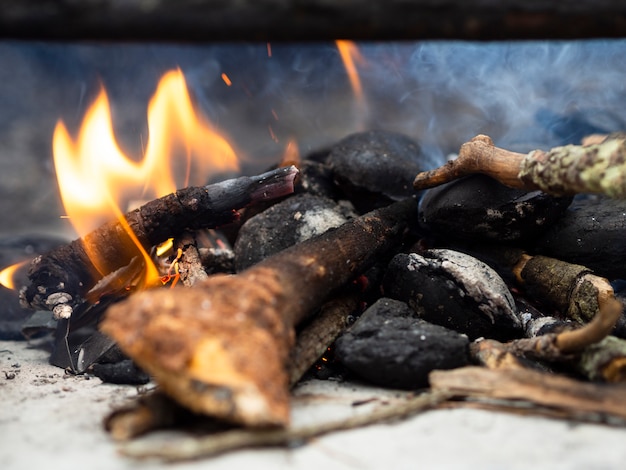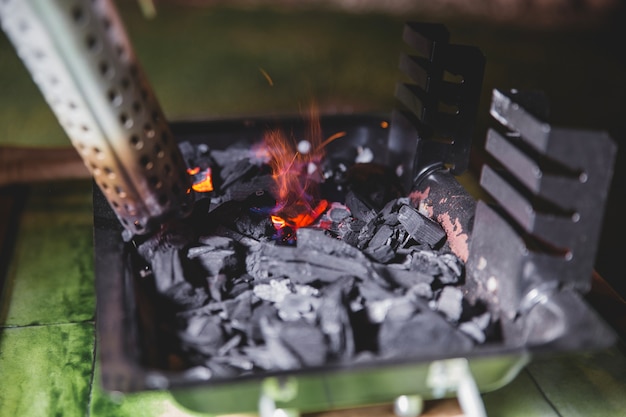Is Charcoal Eco Friendly?
Charcoal is a widely used fuel source that has been in existence for thousands of years. It is commonly used for cooking, heating, and even in art and beauty products. However, with an increasing focus on sustainability and environmental impact, many people are questioning whether charcoal is truly eco-friendly.
What is Charcoal?
Charcoal is made by heating wood in the absence of oxygen, a process known as pyrolysis. This results in the removal of water, volatile compounds, and other impurities, leaving behind carbon-rich charred material. The charcoal produced can be used as a fuel due to its high carbon content and ability to burn at high temperatures.
The Environmental Impact of Charcoal Production
While charcoal itself is a natural product, the process of producing it can have significant environmental consequences. Deforestation is often associated with charcoal production, as large amounts of wood are required to meet demand. Unsustainable practices can lead to habitat destruction, loss of biodiversity, and increased greenhouse gas emissions.
Additionally, the production of charcoal often involves the use of traditional kilns or open fires, which release harmful pollutants into the atmosphere. These pollutants contribute to air pollution and can have negative effects on human health and the environment.
Sustainable Charcoal Production
However, not all charcoal production is harmful to the environment. Sustainable charcoal production methods exist, such as using waste wood or utilizing fast-growing tree species. By sourcing wood from managed forests and implementing efficient kiln technologies, it is possible to reduce the negative impact of charcoal production.
Alternatives to Charcoal
For those concerned about the environmental impact of charcoal, there are alternative fuel sources available. One popular option is briquettes made from biomass such as sawdust or agricultural waste. These briquettes often have a lower carbon footprint and can be used as a substitute for traditional charcoal.
Another alternative is electric grills or stoves, which eliminate the need for charcoal altogether. While they may not provide the same smoky flavor as charcoal, electric grills offer a convenient and eco-friendly cooking solution.
How polluting is charcoal?
Charcoal has long been a popular fuel source for cooking and heating in the UK, but have you ever wondered how polluting it is? Let’s dive into the environmental impact of charcoal production and usage.
Production
Charcoal is primarily made from wood, which is burned in a low-oxygen environment to create carbon-rich charcoal. This process releases significant amounts of carbon dioxide (CO2) and other pollutants into the atmosphere. In fact, a single kilogram of charcoal can release over 3 kilograms of CO2 during production.
In addition to CO2 emissions, charcoal production often involves deforestation and habitat destruction. Unsustainable logging practices can have devastating impacts on local ecosystems and contribute to climate change.
Usage
When charcoal is used as a fuel, it emits carbon monoxide (CO), volatile organic compounds (VOCs), and particulate matter into the air. These pollutants can have harmful effects on both human health and the environment.
“Charcoal burning releases a range of pollutants that can cause respiratory and cardiovascular problems.”
Furthermore, when charcoal is burned in large quantities, it can contribute to air pollution and smog formation. This is particularly concerning in urban areas with high population densities.
Alternatives
If you’re concerned about the environmental impact of using charcoal, there are several alternatives you can consider:
- Electric grills: Electric grills produce no direct emissions and are more energy-efficient than charcoal grills.
- Natural gas grills: Natural gas is a cleaner-burning fuel compared to charcoal and produces fewer emissions.
- Biomass briquettes: Made from renewable materials, biomass briquettes offer a more sustainable alternative to traditional charcoal.
By choosing these alternatives, you can reduce your carbon footprint and help mitigate the environmental impacts associated with charcoal production and usage.
In summary
While charcoal is a popular fuel source, it is important to be aware of its environmental impacts. From deforestation and CO2 emissions during production to air pollution during usage, charcoal contributes to various forms of pollution.
Consider exploring cleaner and more sustainable alternatives to minimize your impact on the environment. As consumers, we have the power to make choices that promote a greener future.
What is the most environmentally friendly way to BBQ?
Barbecuing is a beloved summer pastime, but it’s important to consider the environmental impact of our grilling practices. By making a few conscious choices, we can enjoy a delicious BBQ while minimizing our carbon footprint.
Charcoal or Gas: Which is better for the environment?
When it comes to choosing between charcoal and gas grills, the greener option is clearly a gas grill. Gas grills produce fewer emissions and require less energy compared to charcoal grills. They also heat up faster and provide better temperature control, making them more efficient for cooking.
Did you know:
According to a study conducted by the Oak Ridge National Laboratory, gas grills emit about half the carbon dioxide (CO2) compared to charcoal grills.
Choosing sustainable charcoal
However, if you prefer the smoky flavor of charcoal grilling, opt for sustainable charcoal options. Traditional charcoal is often made from unsustainable sources such as tropical hardwood, which contributes to deforestation. Instead, look for charcoal made from sustainably harvested wood or coconut shells.
Tip:
Avoid charcoal briquettes that contain added chemicals or additives. These can release harmful pollutants when burned.
Offsetting your BBQ emissions
Regardless of your choice of grill, there are additional steps you can take to minimize your BBQ’s environmental impact. One option is to offset the emissions produced by your BBQ by planting trees or investing in renewable energy projects.
Reducing waste and using eco-friendly utensils
Another way to make your BBQ more environmentally friendly is by reducing waste and using sustainable utensils. Instead of disposable plates, cutlery, and cups, opt for reusable or compostable alternatives. Consider using bamboo skewers instead of plastic ones.
| Tip | Description |
|---|---|
| Grill local and organic produce | Support local farmers and reduce the carbon footprint associated with transportation. |
| Use a lid on your grill | This helps retain heat, reducing cooking time and energy consumption. |
| Choose sustainable seafood options | Look for sustainable fish choices to protect our oceans and marine life. |
The power of leftovers
Lastly, don’t forget about the power of leftovers. Plan your BBQ portions carefully to avoid excess food waste. If you do have leftovers, store them properly and use them for delicious meals in the following days.
In conclusion, by choosing gas over charcoal, opting for sustainable charcoal options, offsetting emissions, reducing waste, and making conscious choices, you can enjoy a BBQ that is not only delicious but also environmentally friendly.
Is Charcoal Bad for the Environment?
Charcoal is a popular fuel source used for various purposes, from cooking to heating. However, concerns have been raised about its impact on the environment. Let’s explore the environmental implications of charcoal production and usage.
Environmental Impact of Charcoal Production
The production of charcoal involves cutting down trees and burning them in a low-oxygen environment to remove moisture and impurities, resulting in the formation of carbonized wood. This process contributes to deforestation, habitat loss, and the release of greenhouse gases.
Deforestation: The high demand for charcoal leads to extensive logging, depleting forests and disrupting ecosystems. Deforestation not only reduces biodiversity but also exacerbates climate change by releasing stored carbon into the atmosphere.
Air Pollution: The burning of wood during charcoal production emits harmful pollutants such as carbon monoxide, particulate matter, and volatile organic compounds. These pollutants contribute to poor air quality and can have detrimental effects on human health.
Impacts of Charcoal Usage
While charcoal production has significant environmental implications, its usage also plays a role in environmental degradation.
Carbon Emissions: When charcoal is burned, it releases carbon dioxide (CO2) into the atmosphere. CO2 is a greenhouse gas that contributes to climate change. Using charcoal as a fuel source, particularly in large quantities, can significantly increase carbon emissions.
Alternative Renewable Fuels: To address the environmental concerns associated with charcoal, it’s important to consider alternative renewable fuel sources. Some options include sustainable wood pellets, bioethanol, and electric-powered alternatives for cooking and heating.
“Charcoal production and usage have notable environmental impacts, especially in terms of deforestation and carbon emissions. Exploring renewable fuel alternatives can reduce our reliance on charcoal and mitigate its adverse effects on the environment.” – Environmental Expert
Conclusion: While charcoal is a widely used fuel source, its production and usage have negative impacts on the environment. It contributes to deforestation, air pollution, and carbon emissions. To minimize these effects, promoting sustainable alternatives and responsible consumption practices is essential. By choosing cleaner and renewable energy sources, we can help protect the environment and reduce our carbon footprint.
Is Charcoal More Eco-Friendly than Propane?
When it comes to choosing a fuel source for grilling, many people debate between charcoal and propane. While both have their advantages and disadvantages, the question of which is more eco-friendly often arises. Let’s take a closer look at the environmental impact of these two popular grilling options.
Charcoal
Charcoal is made from wood, typically hardwood, which is burned in a low-oxygen environment. This process removes moisture and other impurities from the wood, leaving behind carbon-rich charcoal. While charcoal is a renewable resource, its production can contribute to deforestation if not managed sustainably.
On the flip side, **charcoal grilling** has a higher carbon footprint due to the release of carbon dioxide (CO2) and other greenhouse gases during the burning process. Additionally, the production and transportation of charcoal also contribute to emissions.
“Charcoal grilling releases more pollutants into the air than propane grilling.”
Propane
Propane, on the other hand, is a fossil fuel derived from natural gas or petroleum refining. It is a clean-burning fuel that produces fewer pollutants and greenhouse gas emissions compared to charcoal. Propane grills also heat up faster and offer better temperature control, making them more efficient for cooking.
However, the extraction and transportation of propane can have negative environmental impacts, including methane leaks during extraction and potential spills during transportation.
The Verdict
In terms of eco-friendliness, neither charcoal nor propane is perfect. Both have their pros and cons, and the choice ultimately depends on various factors such as personal preference, convenience, and availability.
If you are concerned about your carbon footprint, propane grilling may be a better option due to its lower greenhouse gas emissions. However, it’s important to select sustainably sourced charcoal if you decide to go that route.
“The key to eco-friendly grilling is to choose the most sustainable fuel source and use it responsibly.”
Remember to consider other aspects of sustainability as well, such as using natural and biodegradable charcoal starters and **recycling** the packaging properly.

